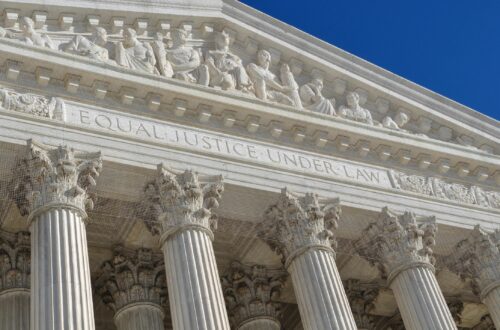“How can anyone, any human being, see that poor defenseless lion and feel no moral outrage?” some people said. “No one with any moral scruples can watch the Planned Parenthood videos and remain a supporter of such an organization,” others cried. Yet, for some reason, many people defy the supposedly obvious evidence. Are they mad, irrational or psychopathic?
I suppose many people just throw their arms in the air and give up. “How on earth can I persuade someone about the evils of Planned Parenthood or big game hunting if they cannot see what is in front of their face?”
Of course, they did see it; they just didn’t get it.
There are many other evidences that seem, to some, to be incontrovertible. Consider debates about the veracity of evolutionary theory or the debate over marriage. What seems perfectly obvious and clear to one side counts for naught on the other.
How is it that evidence, even of the strongest kind, sometimes does precious little to persuade people? Here are some thoughts:
First, people measure evidence against presuppositions. Worldviews have commitments about reality that are fundamental. In other words, every worldview has a starting point for how we think about everything else. A theist is committed first to the existence of God. Since God exists the world is a theistic world. This may unpack in various ways, but the worldview contains a basic belief that affects every other belief.
The same is true for atheism. Consider abortion. Evidence is presented that killing an unborn child is morally abhorrent: “Look how calmly they talk of dead children and their organs!” However, the argument faces a different worldview, one that places a value above that of a fetus. To rob a woman of abortion as course of action limits their autonomy. What other option is there? Men are unreliable. Things cost money. If I keep my baby I will be poor, ill educated, and utterly dependent on society to care for me. Those arguments make sense if one believes that primary reality is material and economic not theistic.
The point is that we all measure evidence against a prior standard. We all have givens, beliefs that are foundational to our thought. If one is a theist, then abortion is likely (but not necessarily) to be perceived as wrong in some way. This is because human beings, according to the theist, are of special significance in the creaturely kingdom; they are made in the image of God. Killing an unborn child is an affront to God himself.
If one is an atheist, on the other hand, then the apparent life in the womb can be downgraded in terms of value when measured against the material and economic reality women face in the world. There is, according to this view, no supreme governing authority on the value of human life. We set the values.
By the way, this may explain why the lion appears in the discussion. The lion, on the atheist view, having only slightly less value than the human, and that only because humans are more advanced on the evolutionary scale, is to be protected; it has dignity of the same kind as the human if only slightly down the scale. For the theist, who may have been heard to tweet something like: “how can they be upset about the lion when so may babies are being murdered”, believes that human beings have a value of a different kind than animals. An act of killing a non-human creature is not in the same category as an act of killing a human who is made in the image of God.
A side point: I, being a Christian theist, am strongly against abortion, but I do not consider the killing of a lion to be anything like as bad as abortion. You might feel differently, but at least you can see why we feel differently and that there is a reason for feeling differently about an unborn child and a lion. Okay, moving on…
Second, we expect too much from evidence. Evidence is not designed to be completely persuasive. And for good reason. We don’t have enough! Limited knowledge of the world means we recognize that evidence is not always sufficient to persuade. Something else may be required. Evidence, such as a video or a picture, is always incomplete. There must be more to this picture, we reason.
For this reason, we often defer our judgement to those who appear to have access to more information, more evidence. People are often persuaded to stick to their views about something, even in the face of overwhelming evidence to the contrary, by the assurance of an “expert.” Campaigners for Planned Parenthood deployed their experts to assure the public that the videos were doctored. Even though this is a spurious claim, an expert is often enough to convince people who already desire to belief that Planned Parenthood is an innocent victim of harassment.
Third, evidence works best when it confirms suppositions. Actually, that is what scientists suggest. A hypothesis is made–an explanation of a given set of phenomena–and tested against observation. Consequently, evidence counts better when it confirms a hypothesis rather than when it denies a it, especially when the hypothesis is considered of high or even highest value.
Scientists have to work hard to overcome the desire to make evidence confirm their hypothesis rather than invalidate it. It is part of their training to be open to their hypothesis being wrong. We who watch Twitter and Facebook are not so diligent. Our laziness lets evidence say whatever we think it should. We actively seek out those feeds that agree with us and tend to skim past those who don’t.
Fourth, evidence is presented to people who have affections. We desire things – ideals, certain material comforts, relationships, approval from others, peace with a friend, good career prospects and to be right about the world. Our affections drive our ability to weigh evidence; they sift evidence by judging what appears to be a threat to what we hold dear. If we love our life as it is, we will discard evidence that appears to show it to be sinful or wrong.
This has to do with ownership. If we own a life–it is ours–we want to like it. A trivial example might get at the point: I used to buy far too many cassettes (yes, cassettes. Look them up). Sometimes I would buy a cassette because I liked the cover. I would listen to it and because I bought it and now owned it I would want to like it. The truth is I tend to like the music that I own more than the music I do not own. The music had to be really bad for me to own up to making a mistake in my choice. But I would try my hardest to like it before giving in and discarding the cassette. The same is true of life. I want to like the life I live because I don’t want to believe that I made a mistake in choosing it.
For those involved in abortion, those who have had one and those who provide them, they want to believe that it is morally justified. Same with the hunters. Both are motivated to love their lives.
The consequence of a change of view, especially for an abortionist, is just too much to bear. Realizing I had wasted a few pounds (my cassette buying days were all in Britain) is nothing compared to the consequence of a change of view about abortion.
Imagine if you had performed a thousand abortions and evidence came to your desk that you had murdered a thousand children. How would it be possible to cope with such a truth? What would you do? It is likely that anyone in that position, and there are many, would work as hard as he or she could to dispute the evidence in front of them no matter how incontrovertible.
Of course, one might suggest that all those reasons are not good reasons to reject evidence. Most reasons for rejecting evidence are not based on morally praiseworthy grounds. Ignoring evidence because it makes one uncomfortable, for example, implies a person lacks courage.
A refusal to consider the view of another person is also a defect, not necessarily in reasoning, but in discourse. If I am to persuade another of my view I had better understand what the other person believes and be able to state it in the strongest possible way. I might not agree or even be mildly persuaded, but I will understand what I am up against. I have tried, in this post, to state an example of a pro-choice view from a woman’s point of view. If I have failed then it is not because I intended to misrepresent the view.
As I reflect on how difficult it is for those personally involved in abortion to change their view (the cost appears to be insurmountable) I am reminded that I too have come to points in my life when I knew what I had done was wrong. Evidence came to my desk, so to speak, and I realized that I had done something evil in the sight of God. I thought that there was no way to live with the truth of my own evil. Yet that is the only way to know the amazing grace of God. Christ died for me while I was yet a sinner. In as much as I was in my evil Christ was in his death and his death is what I deserved.
A practitioner, supporter, or victim of abortion who realizes what he or she has done, no matter how bad it is, can be forgiven. We have a choice when evidence tells us we have done something wrong – we can suppress or accept the truth. If we suppress it we will spent our life disregarding the evidence and go to any lengths to ignore and discredit it. If we accept it we realize what it means. As anyone whose conscience has gripped them knows, accepting the truth of our own evil leads to the thought that we deserve to die for it. But there is one who, because of his great love, has died in our place. By his punishment on the cross we can be released from the death penalty. It is possible to accept the truth and be free of the guilt as former slave trader, John Newton knew only too well:


